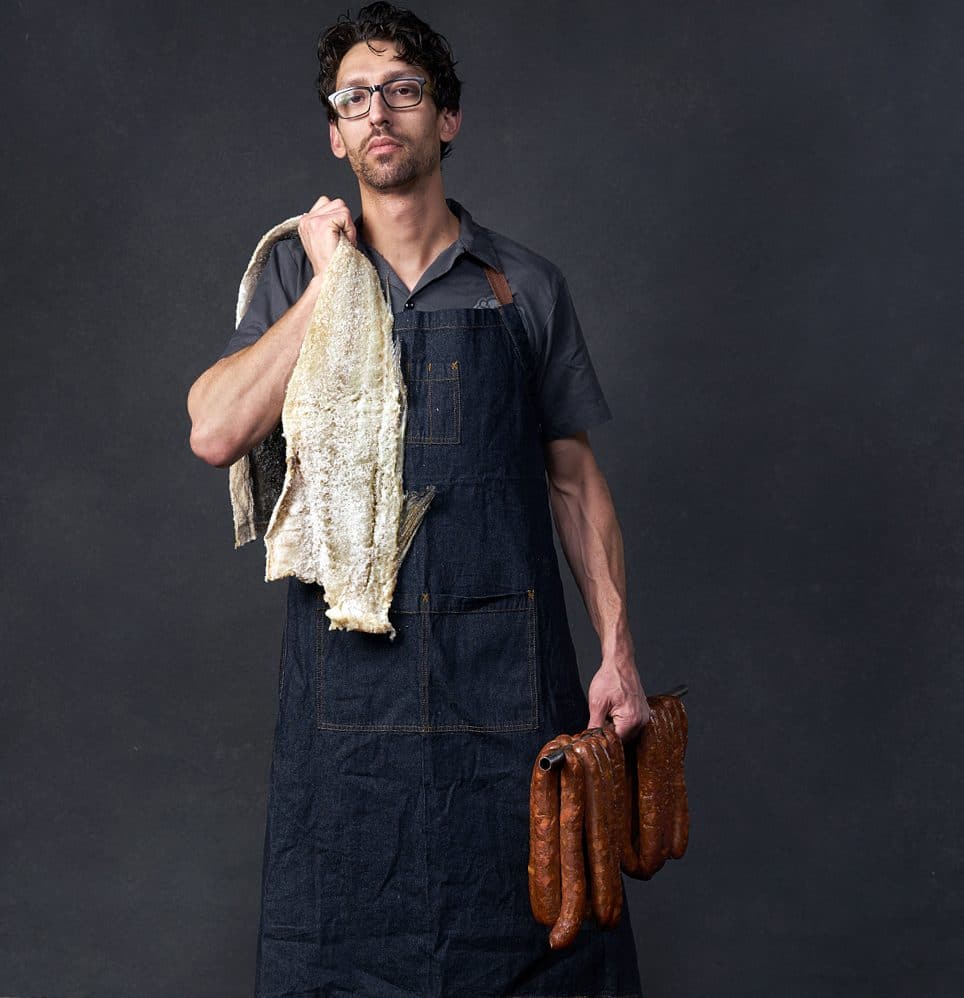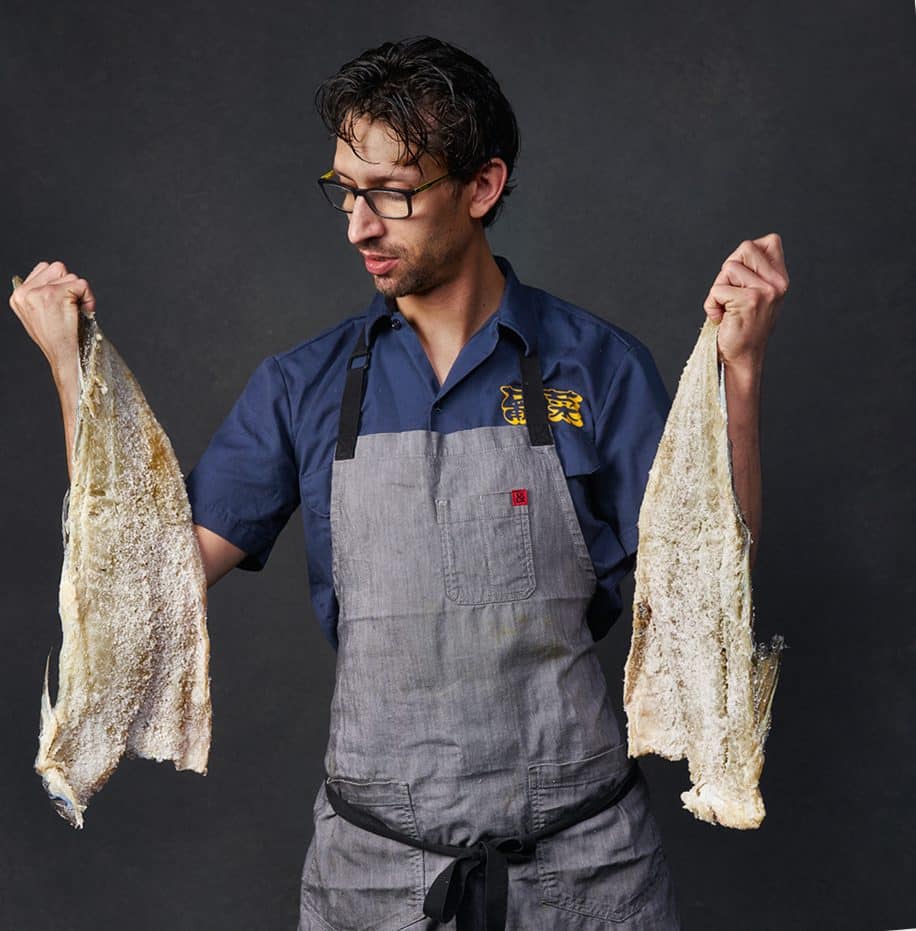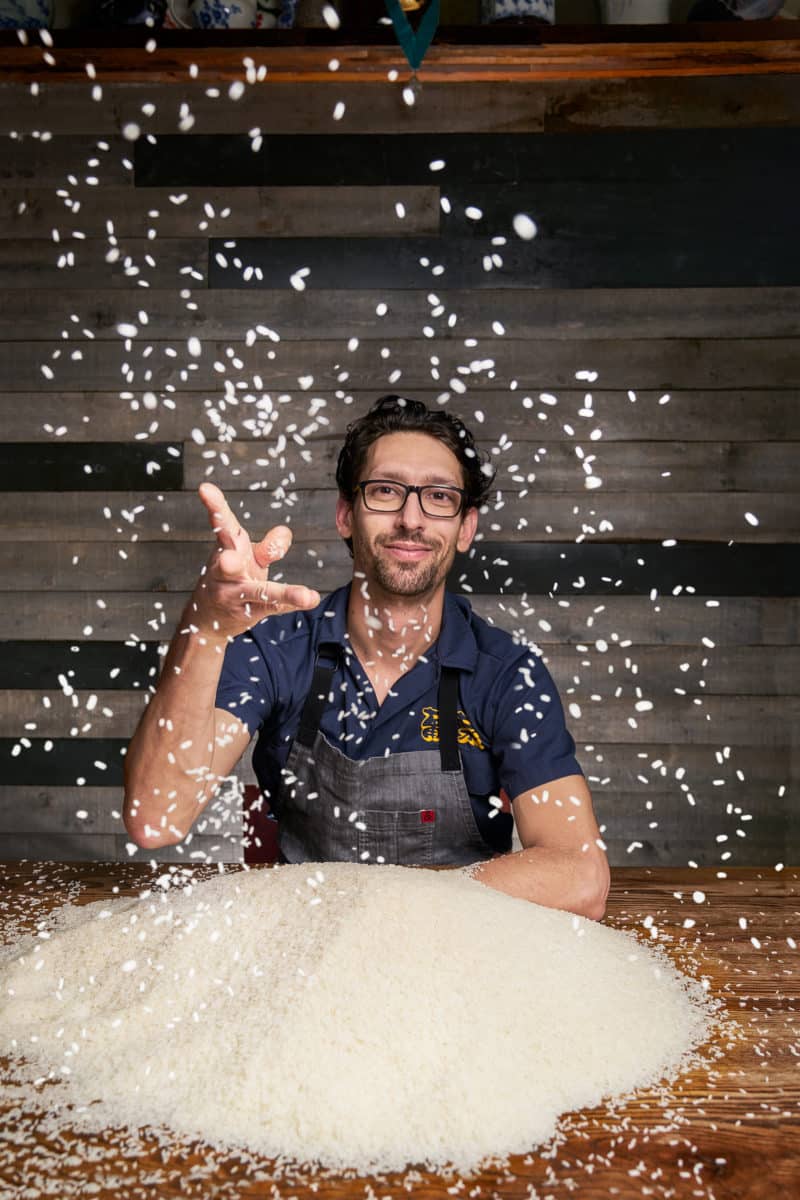Abe Conlon seems impatient as he sits in the dim red light of The Ladies’ Room, his restaurant’s reservations-only cocktail bar made up to look like a 1920s era Chinese lounge. He spends the first ten minutes or so getting up occasionally and leaving the room to check on things. Sounds of dishes being washed and food being prepped drift in through the open door and at one point he deposits a luscious egg tart on the table in front of me in what seems like a peace offering.
Unknown content block type: FlexiblePageTemplateFlexibleContentPhotoFullWidthLayout
{
"__typename": "FlexiblePageTemplateFlexibleContentPhotoFullWidthLayout"
}Conlon’s been doing a lot of interviews lately. While his Chicago restaurant Fat Rice (co-owned with business partner Adrienne Lo) has been garnering attention and accolades almost since the moment it opened in November of 2012, the past few months have seen a flurry of activity thanks to the release of his new cookbook, The Adventures of Fat Rice (Ten Speed Press), which was written in collaboration with Lo and former Fat Rice chef Hugh Amano. His recipes have recently shown up in Food and Wine and Lucky Peach and his days are now split between working at the restaurant and traveling for research and to promote the book.
Now, sitting here, it’s hard to see a time when he might actually stop moving. Conlon seems like a coiled spring, ready to unleash energy at a moment’s notice, and it’s not hard to imagine him darting around the kitchen giving orders. He’s been cooking since childhood and it shows in his wiry frame, intense dedication, and his need for stimulation.
“I’ve always wanted to cook, even since I was five, helping my grandmother and stuff. Being from Lowell I was really exposed to lots of different cultures, and lots of different foods.”
Conlon is referring to Lowell, Massachusetts, an all-American working class mill town now on a semi-upswing after decades of rough times. While there’s a long-standing tendency to view it as yet another Massachusetts town engaged in a battle against poverty and addiction, it’s also a place of growth, and of ethnic and cultural diversity. In 2010 Lowell boasted the highest proportion of Cambodian residents of any city in the country, and it was the Asian markets and cuisine that were the most attractive to Conlon.
“I was definitely like an explorer,” says Conlon. “I loved exploring as a kid, whether it was the ocean, the woods, or the Vietnamese grocery store.” This is a theme present across his life. While his father’s side of the family is Irish, his mother’s side is Portuguese, hailing from the volcanic archipelago of the Azores and the island of Madeira. While the Portuguese made a name for themselves hundreds of years ago as consummate explorers, this is particularly true about those from the Azores. They are people from the sea, of the sea, and their propensity for wandering the world’s waterways resulted in Portugal touching and influencing various cultures across the globe.
Like his ancestors, Conlon was influenced by his experiences with those from other cultures.

Many of his childhood friends were Asian and throughout his early life he was routinely exposed to the aromatic herbs and pungent sauces of Southeast Asia. Conlon remembers, “I had Thai friends who’d try to freak me out and give me shrimp paste and fermented garlic sausages and all these kinds of things. I grew an affinity towards these flavors and it was really exciting to me.”
It was excitement and passion that led to him working nights at age 15 at the restaurant Cobblestones of Lowell, and later to enroll in the Culinary Institute of America (CIA) in Hyde Park. After graduating, Conlon, a newly-minted but classically trained chef, rose through the ranks of various kitchens both in the United States and abroad. At age 20 he helped a friend from the CIA, Karina Chez, open an Asian bistro in the Dominican Republic, and afterward worked at places like the now-shuttered Poste Moderne Brasserie in Washington D.C., and Augustine’s at Fredericksburg Square in Fredericksburg, Maryland. He would later even stage in kitchens such as the Green Zebra in Chicago and the famed Alinea.
What’s remarkable about Conlon’s career, though, is not the high-end kitchens in which he worked, but the places less on the radar. While still living in D.C. after leaving his job at Poste he briefly worked in the cheese shop of a Whole Foods located in the neighborhood of Georgetown. Some years later he would again work at a Whole Foods, this time in Chicago, in the role of “Culinary Coordinator,” which Conlon describes as being “the chef of the store.”
During his time at Whole Foods in Chicago he led numerous weekly cooking classes and developed a list of dedicated fans, and met a Sports Illustrated photographer named Matthew Kutz. Kutz was the one who suggested to Conlon that he expand beyond the boundaries of Whole Foods and start doing underground pop-up dinners in various locations across the city. Soon Conlon was hosting dinners in apartments, lofts, art galleries, and even parks. Over time his meals became more elaborate, and he asked for the help of Adrienne Lo, whom he knew from his tenure at Whole Foods. They named their dinner series X-Marx (as in ‘the spot’) and eventually decided to rent a large loft in the South Loop of Chicago, and to move in together.
Meals at the loft quickly became more and more elaborate, which Conlon said allowed him to be more creative and flexible than when he was cooking at Whole Foods. They even eventually came to include guided wine pairings selected by a friend and patron Craig Perman, who ultimately became Fat Rice’s wine director. A cease-and-desist letter from the building’s condo board, the result of complaints from their downstairs neighbor, forced them to move some two years later.

They ultimately found an unused storefront owned by a lenient landlord who allowed them to convert the space into an elaborate (and very much illegal) restaurant disguised to look like a disused antique store. They called it Frankentiques, named after a style of makeshift, bolted-together antiques that characterized the decor of the space. It was there Conlon lived Citizen Kane-style, sleeping in a makeshift bedroom built into the back of the restaurant.
Conlon and Lo ran Frankentiques for two years doing “market dinners” approximately four times a week. The dinners, which highlighted the ingredients and food traditions of the various ethnic enclaves within the city, were an opportunity for Conlon to delve deeply into the food traditions which reminded him so much of his childhood.
The meals were also a substantial change from Conlon’s high-end training and out of necessity (the need to reduce both expenses and the number of dishes which needed washing) they began to serve their food family style. It was a sea change for Conlon and Lo and one that proved to be necessary. “When you’re doing forty covers you can’t cook modern food,” Conlon says, thinking back to his days as an underground restaurateur.
As at X-Marx, rules and regulations eventually caught up with them. Frankentiques was served with another cease-and-desist letter, this time issued directly by the city, and they knew definitively that it was time for a change. Fortunately, they weren’t unprepared.
In 2011, about six months before the city of Chicago put a stop to their ever-evolving paladar, Conlon and Lo visited the Chinese province of Sichuan and enrolled in a tourist’s cooking class at the Sichuan Institute of Higher Learning. It was the same school in which the highly-regarded British expert in Chinese cuisine, Fuchsia Dunlop, learned to cook. The trip was spearheaded by Lo’s father Charlie, who emigrated from China early in life and had always wanted to return. Charlie was the one who found the program at the school and it didn’t take much to rope in his wife, his daughter, and Conlon. They cooked and learned for two weeks and decided afterward to travel to Hong Kong. It was then that Conlon insisted they visit the island of Macau.
There are many parts of Conlon’s life which have influenced his cooking – the funky Asian flavors introduced to him by his grade school friends; the Portuguese classics he prepared with his grandmother during the holidays; even the McDonald’s burgers and fries bought for him by his mother, a single parent who worked as a licensed nurse practitioner.
Perhaps the most influential moment of his professional life though, happened when he was 18 years old and read a story in Saveur written by Margaret Sheridan titled “Original Fusion.” It was about Macau, an island off the coast of China known for its glittering casinos and the curious cultural blend of its residents.
In a world filled with blended cultures Macau might be the most quintessential example of the melting pot – an island where the people are predominantly ethnically Chinese, speak a pidgin of Chinese and Portuguese, and cook food incorporating influences from China, Portugal, India, Malaysia, and Africa. In her story for Saveur Sheridan wrote about the blend of Asian and Portuguese flavors, two flavor palettes that were significant in Conlon’s early life, and she wrote about how Macanese cooking is something of a dying art. Recipes are hoarded like gold and rarely written down, and prep and cooking is time-intensive.
It was a story that stayed with Conlon and now, at age 35, it powers his most successful venture to date. Without “Original Fusion” Fat Rice wouldn’t exist, and Conlon wouldn’t have found the flavors he’d been searching for.
Many chefs avoid talking about their feelings, but asking Conlon how eating on Macau made him feel results in an immediate and clearly heartfelt response. “Home. Home. It was the home I hadn’t ever had. It was a place I’d read about twelve years prior and it was something that’s always been in the back of my mind. It brought me together.”
This, more than anything, might be the encapsulation of what powers Conlon and Fat Rice. Macanese cuisine, with its unique mishmash of culture and location, is inherently of both one and many places simultaneously. It’s challenging and welcoming, familiar and hidden. It’s interesting, and it’s unknown.
Unknown content block type: FlexiblePageTemplateFlexibleContentPhotoFullWidthLayout
{
"__typename": "FlexiblePageTemplateFlexibleContentPhotoFullWidthLayout"
}Abe Conlon’s career, like that of his cultural and ethnic forebears, has been one of movement exploration. Macanese cuisine captures that essence, and Fat Rice channels it. It is, as Sheridan said, the original fusion, and Conlon’s interpretation is equally as elegant.
“A Portuguese person gets to Goa, India. And they say ‘my wife back home used to make me this delicious dish.’ Or, here, this is what I know about this delicious dish, let me show it to you. And then they take what they have on hand and they take what they know and they apply it to this concept, and that becomes its own unique dish. And that situation keeps happening, and then they get to Malaysia and they’re like ‘my Goan wife used to make this dish, it was like this, like this, like this…’”
Looking up, Conlon takes a drink of water and says, “The Portuguese thread for me is kind of the thing. No, I didn’t grow up in Malaysia. No, I didn’t grow up in Macau. No, I didn’t grow up in India. But…this is a part of my history.” ![]()
First published December 2016
